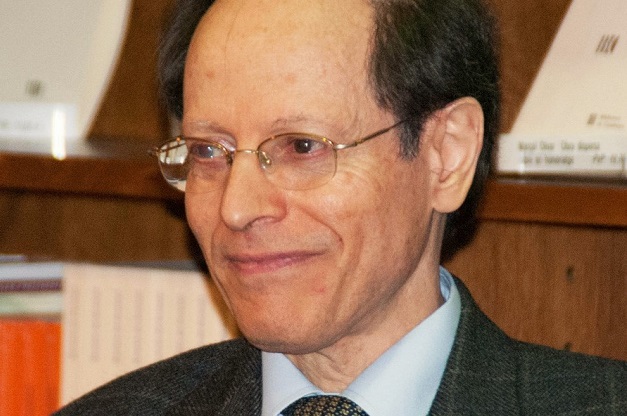“As we mourn, the greatest need is to feel accompanied and loved”
An interview with psychiatrist Pablo Martinez. “Farewell is the natural gateway to mourning”, he says. “Being deprived of this option is an obstacle that complicates the subsequent process”.
25 MAY 2020 · 10:45 CET

Pablo Martinez Vila is a well-known psychiatrist, author and international speaker.
He has written several books about bereavement, how it affects people and their conflicts to cope with it, including Tracing The Rainbow: Working Through Loss And Bereavement and A Thorn in the Flesh: Finding strength and hope amid Suffering
Question. Could you define what is behind that feeling we call mourning?
Answer. Mourning hurts. Above all there is deep sorrow and much pain. However, there is a key concept that helps us to change our negative, dark vision of mourning: in mourning there is not only pain, there is also love.
Mourning is an expression of love, it is the other side of love. We cry because we love. And the greater the love, the deeper the pain. Mourning is the price paid in pain for the end of a dear and valuable relationship.
The view of mourning as a posthumous expression of love is a balm that mitigates grief. This positive vision sheds light on the darkness of sorrow and can help us grow. In fact, mourning changes us, we are never the same again.
Q. There is a natural mourning, and a time when mourning becomes a problem in itself. How do we distinguish them?
A. Mourning is always a difficult path, but some people find it more difficult than others. That happens when the mourner is unable to accept or learn to live with the loss and the feelings that it brings.
In those cases, grief is denied (absent grief), postponed (delayed grief) or prolonged (chronic grief). These three are reactions of pathological grief that usually come with anxiety or depression.
There is a quite reliable way to know when grief is becoming abnormal: the person is unable to return to everyday life. The bond with the loved one is so intense that they cannot free themselves from him or her, so that they cannot cope adequately with life. That feeling of paralysis, “my life ended the day he / she left”, signals a complicated grief.

Psychiatrist and author Pablo Martínez Vila. / Photo: Héctor RivasQ. Due to the coronavirus pandemic, many have experienced the death of loved ones from far away, without being able to be next to them in their last moments. How does this affect us?
A. It affects us a lot. This has been one of the most devastating effects of the pandemic from an emotional point of view.
Being alongside and farewell at the hour of death are needs deeply rooted in human nature, because death is not a natural thing; death is the most unnatural thing that exists.
We were not created to die but to live. Contrary to what some thinkers like Heidegger say, we do not exist to die, but to live. Death is a foreign body in God's creation, in the words of Paul, “it is the last enemy”.
Therefore, being there alongside becomes like the ointment that alleviates the pain of separation. Farewell is the natural gateway to mourning. Being deprived of this option is an obstacle that complicates the subsequent process.
The Bible gives great importance to this aspect. Some of the most beautiful words of the patriarchs were spoken in those parting moments. Jacob’s blessing on his children is a good example (Genesis 49). Likewise, when Paul bids farewell to the Ephesian elders, he gives a moving and inspiring speech (Acts 20: 17-38).
Q. We have not been able to share those losses with the family and community either, even to attend the funeral. It is like living a virtual death, but at the same time we know that it has happened by the emptiness that it brings. How can we face this situation?
A. Mourning is a personal experience, but not an individual one; it has a community dimension. Crying together is therapeutic, crying alone can be bitter.
Above all, it is necessary to mourn together as a family. Solitary mourning is more likely to become a pathological grief. Moreover the believer has another family, the family of faith, which gives us the warmth of brotherly love.
It is at those times of sorrow when we can deeply experience that the church is a therapeutic community. In my own time of mourning, I remember the affection and support received from the brethren as an unforgettable experience and a source of much encouragement.
In the current circumstances of the pandemic, we cannot embrace each other physically, but we can support each other through the means that technology provides (messages, video calls, telephone, etc.). Today more than ever we can make the grieving person feel that we are close.
Being ‘connected’ is much more than a technological issue, it is a spiritual reality because, as the body of Christ, we belong to each other.
Q. How does the Bible, as the Word of God, help us understand and assimilate not only mourning, but these very special situations?
A. The Gospel provides two pillars that sustain us in the hour of mourning: trust and hope. Our confidence is that the keys to life and death belong only to God (Rev. 1: 8). None of us will be uprooted from this earth a minute before, or a minute after what God has designed in his wise providence.
As I recently wrote in an article, the Christian’s confidence lies in the conviction that it is not a virus but God who keeps time on our life clock.
The other pillar is hope. There are tears full of hope and there are tears full of despair. Christians also cry, but our tears are full of the hope that Christ gives us.
Jesus is not the weak man nailed to a cross that Nietzsche ridiculed, but the One who rose with power from the grave and defeated death with his resurrection. This is the unshakable hope, the sure anchor of our faith: because Christ is risen, we too will be resurrected (Rom. 8:11).
That is why Paul cries out victoriously, “Where, O death, is your victory? Where, O death, is your sting?” (1 Cor. 15:55).
Q. Many pastors wonder how to help or support those who have suffered the loss of a loved one. What is your advise for them?
A. People in mourning during this pandemic suffer additional pain from the loneliness and isolation already mentioned. In addition, the pain multiplies because “everything happens very quickly”, without time to assimilate it.
Because of this, their greatest need is to feel accompanied and loved. Therein lies the essence of comfort.
How do we do it? When we console others, speeches are unnecessary and gestures of love are needed. A love gesture is much more encouraging than an eloquent word. A golden principle to accompany the mourner is: “speak little, listen much and help all you can”.
Q. Is there anything you would like to add?
A. "Comfort, comfort, my people" (Is. 40:1). That is how the first of the songs of the Suffering Servant begins and so does Handel's Messiah. What an astounding opening note! The first two words of God to announce the coming of the Messiah are powerful words of comfort.
It's not by chance. With the coming of Christ to the world, an expiration date was set for death and all suffering. God comforts by providing hope.
True comfort, the comfort that reaches the heart, cannot be separated from the person and work of Jesus Christ. The ultimate answer to the pain of mourning is in the pain of the Suffering Servant. With his death he conquered death (Heb. 2: 14-15) and opened the door of Hope with a capital letter, the hope of a day when “He will wipe away every tear from their eyes, and death shall be no more, neither shall there be mourning, nor crying, nor pain anymore, for the former things have passed away” (Rev. 21:4).
There is consolation in this hard time of pandemic that we have to live. It is the “strong encouragement” given to those who “hold fast to the hope set before us. We have this as a sure and steadfast anchor of the soul” (Heb. 6:18-19).
Published in: Evangelical Focus - life & tech - “As we mourn, the greatest need is to feel accompanied and loved”
Since you are here…
Evangelical Focus is a news and opinion platform that brings together Christians from across Europe and other parts of the world. We need the support of our readers to make this media project sustainable in the long term. You can support our work! Read about Evangelical Focus’s sustainability here.
Would you like to support the work of Evangelical Focus?
Use one of these methods. You can also transfer your donation to “Areópago Protestante / Evangelical Focus” IBAN: ES8521000853530200278394 (Swift / BIC: CAIXESBBXXX). Subject: “Donation Evangelical Focus”
